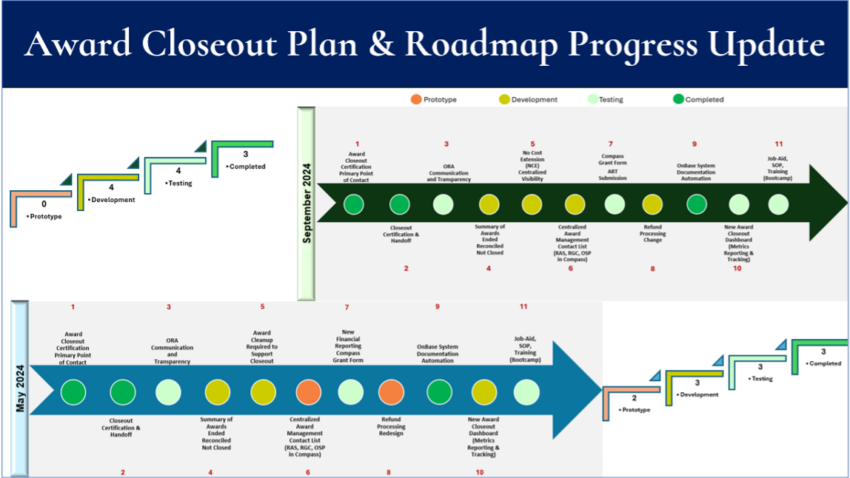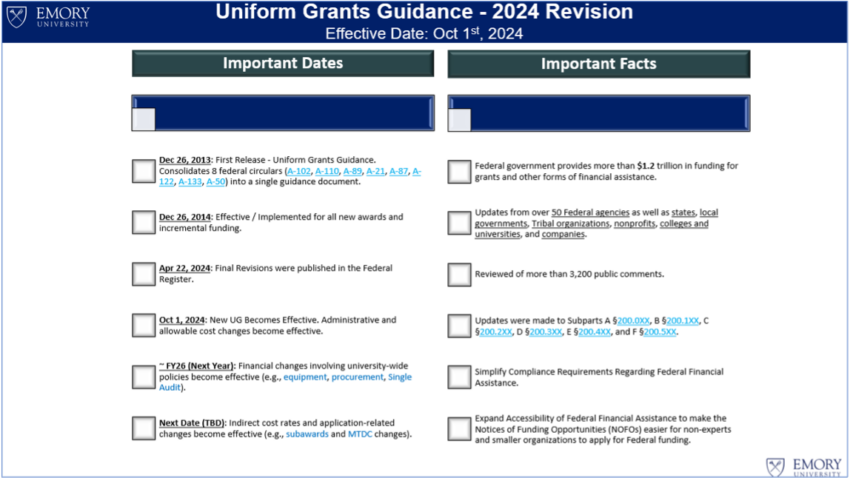Author: Patrick Amihere, Associate Director (RGC)
To ensure proper, timely, and effective award closeouts for all sponsored awards, ORA and RGC continue the spectrum of work to make Award Closeout more effective and efficient institutionally. Therefore, it is not a surprise that the immediate improvement of an effective award closeout business process is the university’s No. 1 priority. The progress of the established Plans and a Roadmap to enforce effective and proper closeout of all sponsored awards granted to Emory University is moving forward steadily as listed below. Below are the updates of work being performed to strengthen Award Closeout within Emory University.
Emory’s Award Closeout Processes/Projects Development
Testing
- ORA Communication and Transparency
- New Financial Reporting Compass Grant Form
- New Award Closeout Dashboard (Metrics Reporting & Tracking)
- Job-Aid, Standard Operating Procedures, Training (Bootcamp)
Development
- Summary of Awards Ended Reconciled Not Closed
- Award Cleanup Required to Support Closeout
- Centralized Award Management Contact List (RAS, RGC, OSP in Compass)
- Refund Processing Redesign
Completed
- Award Closeout Certification Primary Point of Contact
- Closeout Certification & Handoff
- OnBase System Documentation Automation
Summary of Revised Uniform Guidance
- Final revisions of the UG will be effective 10/01/2024 for awards issued on or after that date.
- The revision included updates from over 50 Federal agencies as well as states, local governments, Tribal organizations, nonprofits, colleges and universities, and companies
- Reviewed of more than 3,200 public comments.
- Updates were made to the following Subparts.
- Subpart A §200.0XX
- Acronyms & Definitions
- Subpart B §200.1XX
- The federal equipment threshold increased from $5,000 to $10,000
- Indirect expenses can now be taken up to the first $50,000 of a subaward/subcontract
- The definition of ‘intangible property’ has been expanded to include data, websites, trade secret, and intellectual property.
- Subpart C §200.2XX
- The limit for fixed-amount subawards was raised from $25,000 to $50,000.
- Added a new section on Whistleblower protections.
- Clarified the use of prohibited telecommunications and video surveillance equipment and services.
- Subpart D §200.3XX
- Added two subsections on discrimination based on sex orientation or gender identity.
- Reaffirmed the treatment of ‘voluntary uncommitted cost sharing’ for IDC purposes.
- Federal agencies can now approve multiple cost extensions without approval from OMB.
- Increased equipment threshold to $10,000.
- More flexibility has been provided on what to do with unused supplies. The residual supply threshold increased from $5,000 to $10,000
- Eliminated termination flexibility by the federal government. The federal government can no longer unilaterally terminate a project if they don’t feel it fits with their priorities.
- Subpart E §200.4XX
- Removed prior approval requirements for nine items, from 25 to 16 items
- Subrecipients are required to submit similar certifications to pass-through entities. This means that grantees need to ensure they have subrecipient certifications on file.
- Required unused leave to be allocated as general administrative costs. Unused leave cannot be directly charged to an award.
- Allow sponsors with conference programs to provide dependent care for participants.
- Added ‘prizes’ to the ‘entertainment’ section as allowable.
- Allowed ‘closeout costs’ (both direct and indirect costs) until report due dates – 120 days after project end.
- Subpart F §200.5XX
- Raised the Single Audit threshold from $750K to $1 Million.
- Allowed federal cognizant agencies to provide submission extension for the audit team instead of having to get OMB permission.
- Simplify Compliance Requirements Regarding Federal Financial Assistance.
- Expand Accessibility of Federal Financial Assistance to make the Notices of Funding Opportunities (NOFOs) easier for non-experts and smaller organizations to apply for Federal funding.
Conclusion
ORA and RGC is committed to making Award Closeout business processes effective, efficient, and easy to complete.

